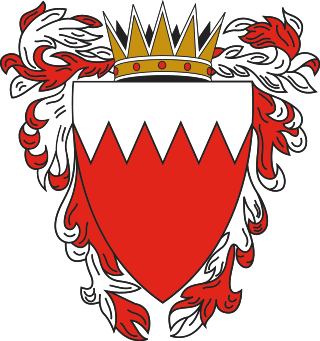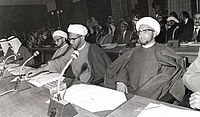
Politics of Bahrain has since 2002 taken place in a framework of a constitutional monarchy where the government is appointed by the King of Bahrain, King Hamad bin Isa Al Khalifa. The head of the government since 2020 is Crown Prince Salman bin Hamad Al Khalifa, who became Prime Minister following the death of Khalifa bin Salman Al Khalifa, and who also serves as Deputy Commander of the Bahrain Defence Force. The parliament is a bicameral legislature, with the Council of Representatives elected by universal suffrage, and the Consultative Council appointed directly by the king.

The National Assembly is the unicameral legislature of Kuwait. The National Assembly met in Kuwait City. The National Assembly is made up of 50 elected members and 16 directly appointed government ministers.

Elections in Botswana take place within the framework of a multi-party democracy and a parliamentary system. The National Assembly is mostly directly elected, and in turn elects the President and some of its own members. The Ntlo ya Dikgosi is a mixture of appointed, hereditary and indirectly elected members.

Elections in Guyana take place within the framework of a multi-party representative democracy and a presidential system. The National Assembly is directly elected, with the nominee of the party or alliance that receives the most votes becoming President.

Elections in Rwanda are manipulated in various ways, which include banning opposition parties, arresting or assassinating critics, and electoral fraud. According to its constitution, Rwanda is a multi-party democracy with a presidential system. In practice, it functions as a one-party state ruled by the Rwandan Patriotic Front and its leader Paul Kagame. The President and majority of members of the Chamber of Deputies are directly elected, whilst the Senate is indirectly elected and partly appointed.

The Council of Representatives, usually referred to simply as the Parliament, is the unicameral legislature of the Republic of Iraq. According to the Constitution of Iraq, it is the lower house of the bicameral legislature of the country. As of 2020, it comprises 329 seats and meets in Baghdad inside the Green Zone.

The National Democratic Labour Action Society – Wa'ad is Bahrain's largest leftist political party.

Al-Wefaq National Islamic Society, sometimes shortened to simply Al-Wefaq, was a Shi'a Bahraini political party, that operates clandestinely after being ordered by the highest court in Bahrain to be dissolved and liquidated. Although from 2006 to 2011 it was by far the single largest party in the Bahraini legislature, with 18 representatives in the 40-member Bahraini parliament, it was often outvoted by coalition blocs of opposition Sunni parties and independent MPs reflecting gerrymandering of electoral districts. On 27 February 2011, the 18 Al-Wefaq members of parliament submitted letters of resignation to protest regime violence against pro-reform Bahraini protestors.

Bahrain has had two constitutions in its modern history. The first one was promulgated in 1973, and the second one in 2002.
Following Bahrain's independence from the British in 1971, the government of Bahrain embarked on an extended period of political suppression under a 1974 State Security Law shortly after the adoption of the country's first formal Constitution in 1973. Overwhelming objections to state authority resulted in the forced dissolution of the National Assembly by Amir Isa bin Salman Al Khalifa and the suspension of the Constitution until 2001. The State Security Law of 1974 was a law used by the government of Bahrain to crush political unrest from 1974 until 2001. It was during this period that the worst human rights violations and torture were said to have taken place. The State Security Law contained measures permitting the government to arrest and imprison individuals without trial for a period of up to three years for crimes relating to state security. A subsequent Decree to the 1974 Act invoked the establishment of State Security Courts, adding to the conditions conducive to the practice of arbitrary arrest and torture. The deteriorating human rights situation in Bahrain is reported to have reached its height in the mid-1990s when thousands of men, women and children were illegally detained, reports of torture and ill-treatment of detainees were documented, and trials fell short of international standards.

The National Assembly is the legislative body of Bahrain. Parliament is bicameral, consisting of the 40 elected members of the Council of Representatives and the 40 royally-appointed members of the Consultative Council. The joint session of the National Assembly is chaired by the Speaker of the Council of Representatives, or by the Speaker of the Consultative Council if the former is absent.

The Council of Representatives, sometimes translated as the "Chamber of Deputies", is the name given to the lower house of the Bahraini National Assembly, the national legislative body of Bahrain.

The Al-Menber National Islamic Society is the political wing of the Sunni Islamist Al Eslah Society in Bahrain and Bahrain's branch of the Muslim Brotherhood. The president and patron of the Al Eslah Society is Shaikh Isa bin Mohammed Al Khalifa, a member of the Al Khalifa royal family and former labor minister of Bahrain. Prominent members of Al-Menber include Salah Abdulrahman, Salah Al Jowder, and outspoken MP Mohammed Khalid. The party has generally backed government-sponsored legislation on economic issues, but has sought a clampdown on pop concerts, sorcery and soothsayers. Additionally, it has strongly opposed the government's accession to the International Covenant on Civil and Political Rights.

The State of Bahrain was the name of Bahrain from 1971 to 2002. On 15 August 1971, Bahrain declared independence and signed a new treaty of friendship with the United Kingdom. Bahrain joined the United Nations and the Arab League later in the year. The oil boom of the 1970s benefited Bahrain greatly, although the subsequent downturn hurt the economy. The country had already begun diversification of its economy and benefited further from Lebanese Civil War in the 1970s and 1980s, when Bahrain replaced Beirut as the Middle East's financial hub after Lebanon's large banking sector was driven out of the country by the war.

General elections were held in Bahrain in November and December 2006 to elect the forty members of the Council of Representatives. The first round of voting was held on 25 November, with a second round on 2 December 2006.

Sheikh Abdul Amir al-Jamri was one of the most prominent Shia clerics and opposition leaders in Bahrain. He was also a writer and a poet.

General elections were held in Botswana on 20 October 1979. The result was a fourth successive landslide victory for the Botswana Democratic Party (BDP), which won 29 of the 32 elected seats, including two in which they were unopposed.

Constituent Assembly elections were held in Bahrain on 1 December 1972. All candidates ran as independents. A total of 15,385 votes were cast, giving a turnout of 88.5%. However, only 12.5% of the population were registered voters at the time.
The background of the Bahraini uprising dates back to the beginning of the twentieth century. The Bahraini people have protested sporadically throughout the last decades demanding social, economic and political rights. Demonstrations were present as early as the 1920s and the first municipal election was held in 1926. Ruled by Al Khalifas since 1783, Bahrain was a British protectorate for most of the twentieth century. The National Union Committee (NUC) formed in 1954 was the earliest serious challenge to the status quo. Two year after its formation, NUC leaders were imprisoned and deported by authorities.

Early general elections were held in Kuwait on 27 July 2013. The elections were required after the Constitutional Court dissolved Parliament and annulled the results of the December 2012 elections. Voter turnout was an estimated 52.5%, which was higher than expected despite an opposition boycott, and only 7% lower than the non-boycotted February 2012 elections.














